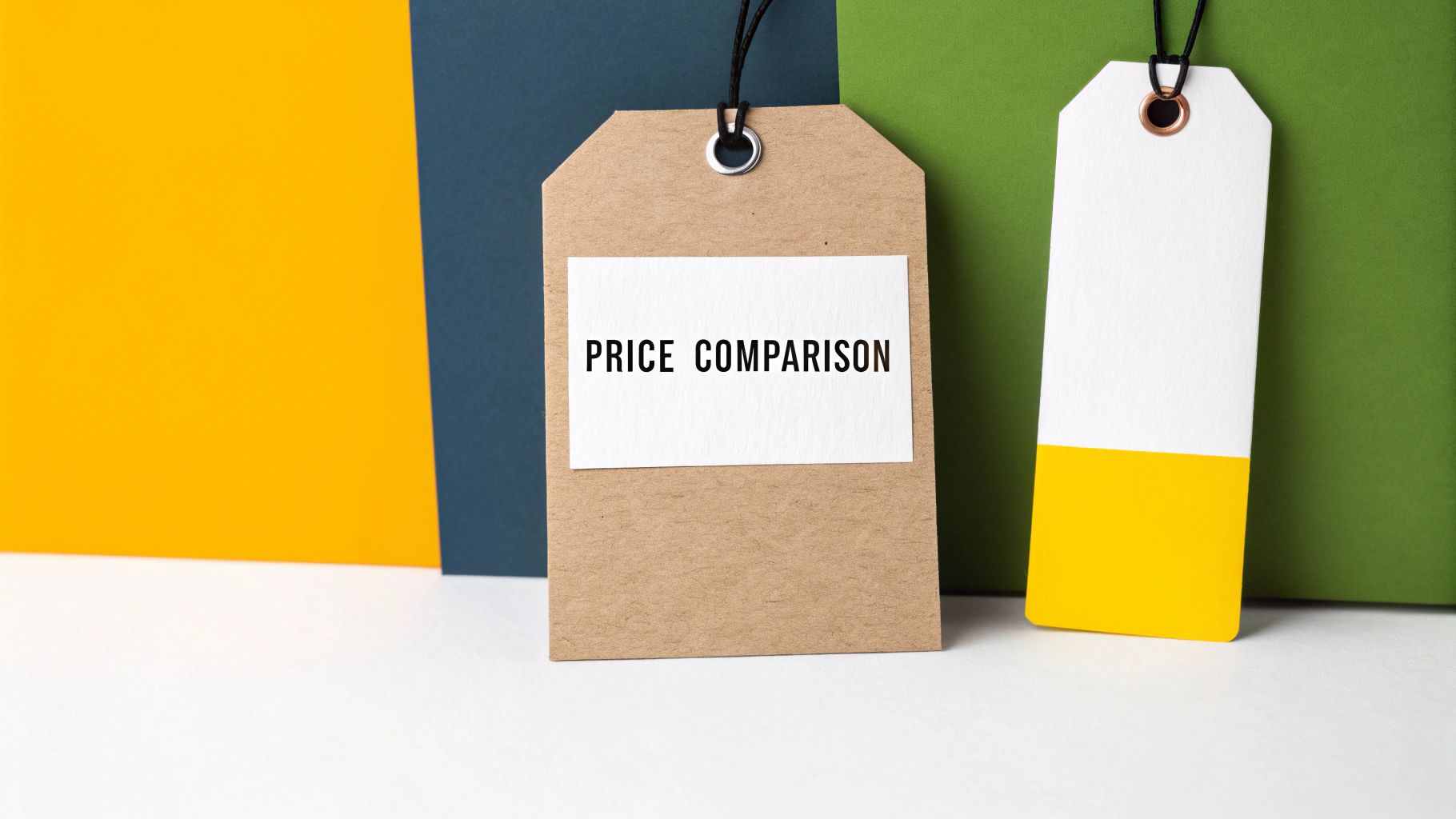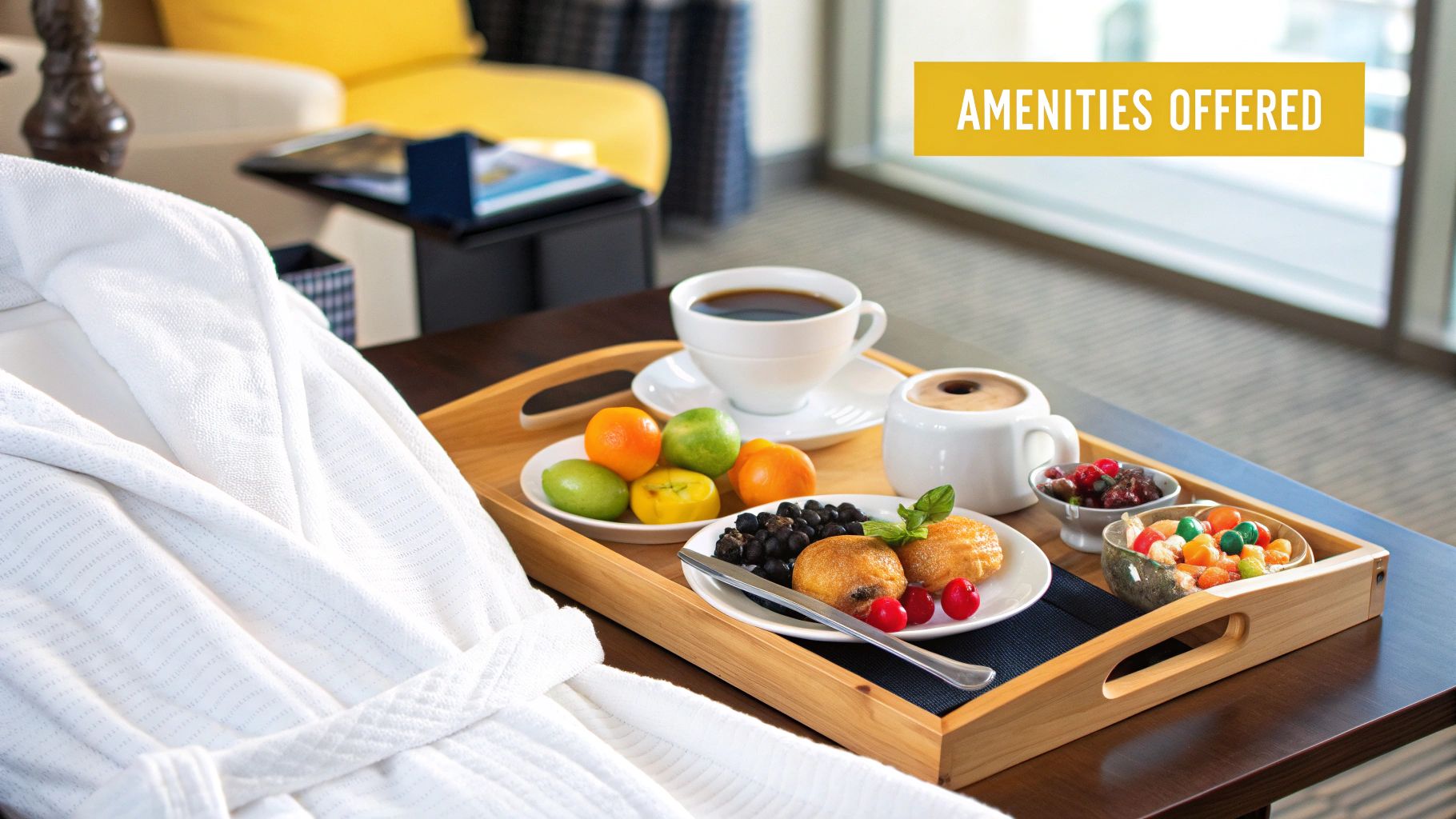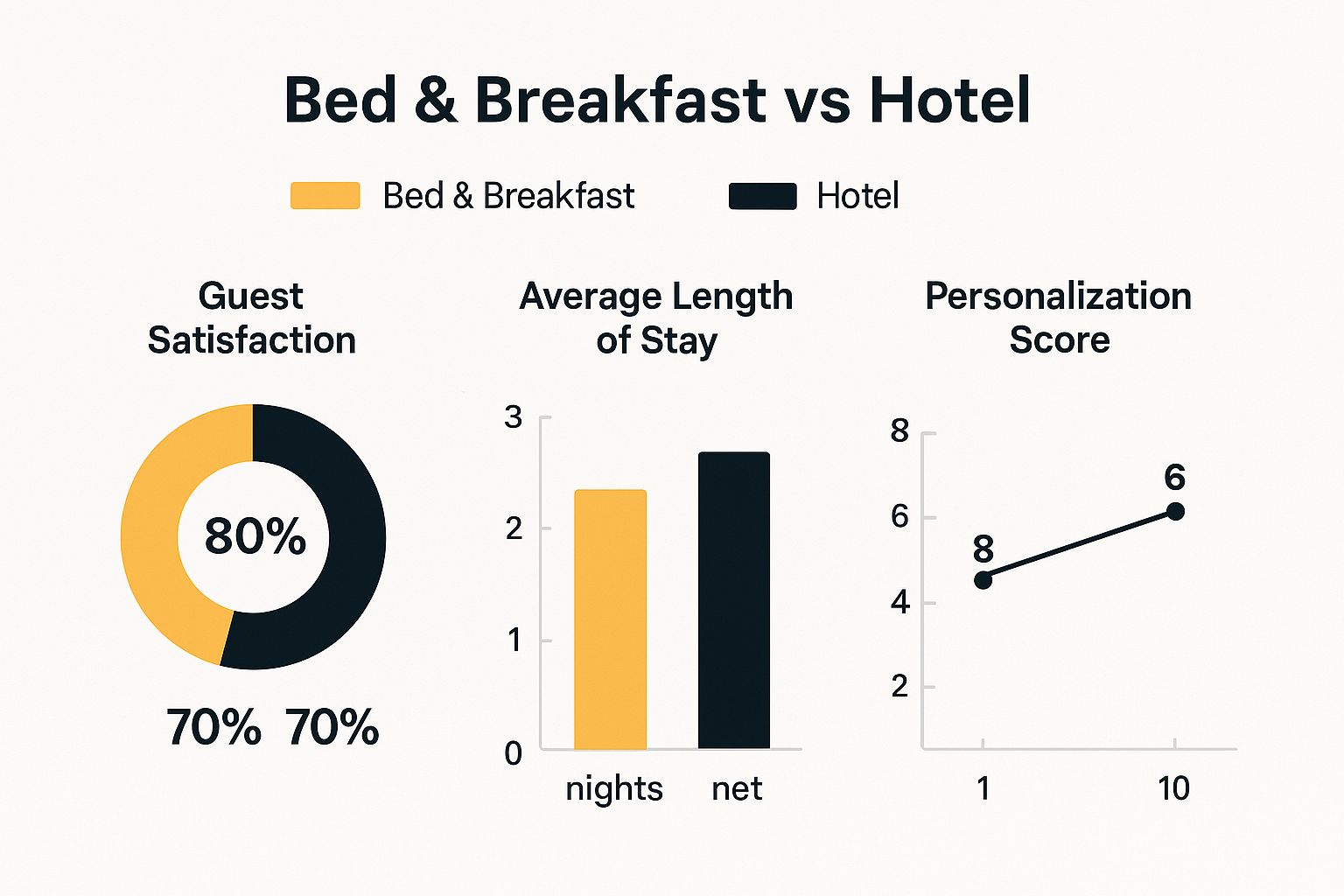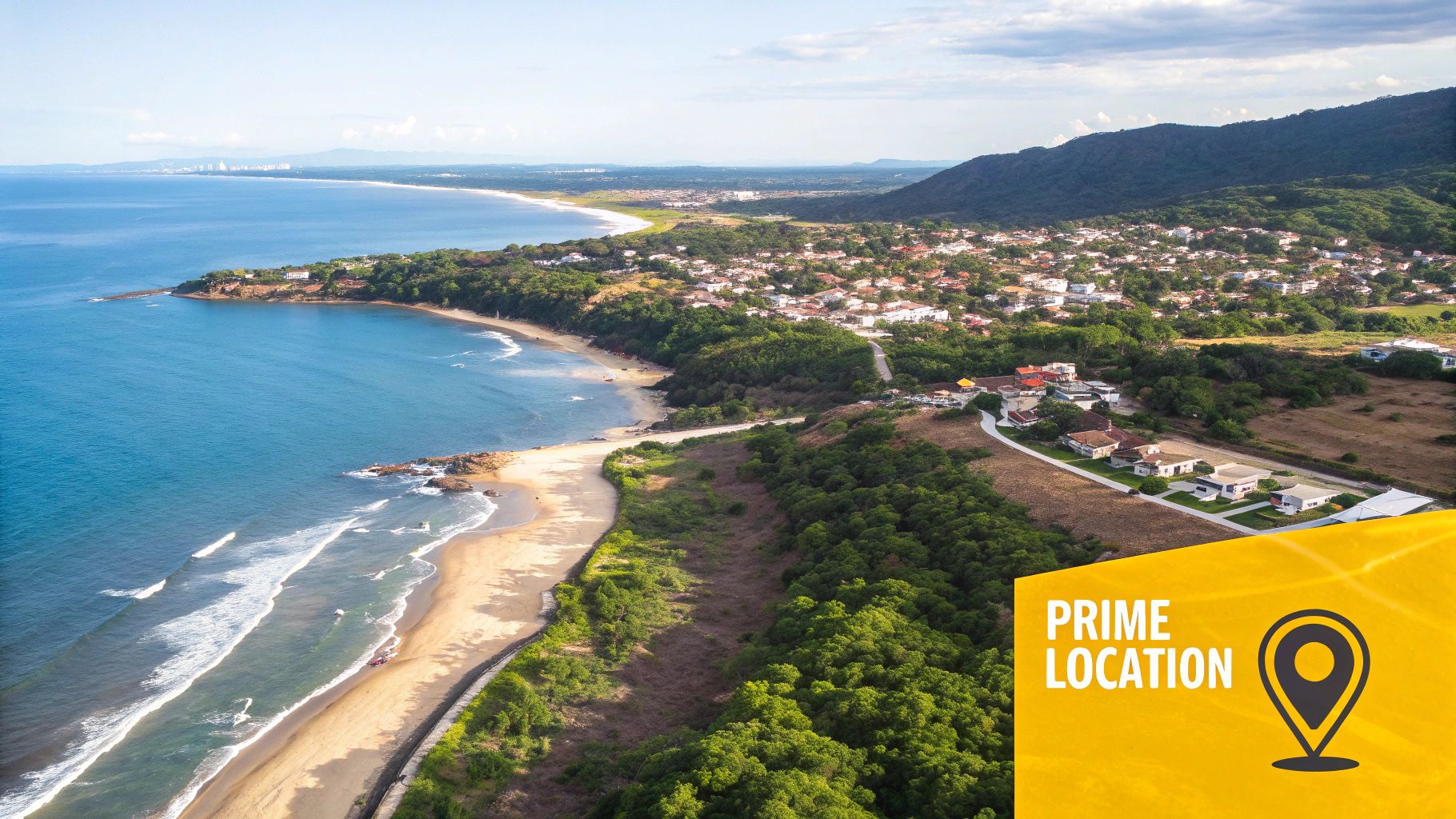Picking between a bed and breakfast or a hotel really boils down to the kind of trip you’re looking for. We face it quite often here at BTOURS to the destinations we are working with. A B&B delivers an intimate, personalised stay where the hosts often feel like long-lost friends, giving you insider tips perfect for a real cultural deep-dive. On the other hand, hotels offer dependable, standardised service with a full suite of amenities, like 24/7 reception and on-site restaurants.
For a self-drive trip through the rolling hills of Ireland or the ancient landscapes of Greece, a B&B can add a layer of unique charm. A hotel, however, provides that predictable comfort you might crave after a long day behind the wheel.
Bed and Breakfast vs Hotel: The Key Differences
When you’re planning a self-drive tour through the winding country lanes of England or along the breathtaking coastal roads of Scotland, your choice of lodging sets the entire tone. The whole bed and breakfast vs hotel debate isn’t just about finding a room for the night; it’s about defining the very soul of your adventure. Are you after the cosy, lived-in feel of a Welsh farmhouse B&B, or do you prefer the seamless, anonymous convenience of a city hotel in Dublin?
The Heart of a Bed & Breakfast
A bed and breakfast is, first and foremost, a personal experience. These are almost always family-owned and operated, typically with fewer than 10 rooms. This creates an incredibly intimate setting where the host is genuinely central to your stay. They’ll point you to the best pub in a tiny Welsh village or a secret viewpoint overlooking a Scottish loch—the kind of local knowledge you just can’t get from a guidebook.
The Reliability of a Hotel
Hotels, of course, operate on a much larger scale. Their main selling point is consistency and a wide array of services. You can almost always count on a 24-hour front desk, room service, and often a pool or fitness centre. That reliability can be a huge comfort, especially when you’re tired from a long day of navigating unfamiliar roads in England or Greece.
At a Glance: B&B vs Hotel Core Distinctions
To lay it all out clearly, the best way to see the differences is side-by-side. This table breaks down the fundamental distinctions that will shape your stay.
| Feature | Bed & Breakfast (B&B) | Hotel |
|---|---|---|
| Atmosphere | Intimate, personal, and homely. | Professional, standardised, and often anonymous. |
| Service | Hosted by owners, with personalised attention. | Staffed by professionals, with 24/7 services. |
| Amenities | Basic comforts, unique character, home-cooked breakfast. | Extensive facilities (gym, pool, restaurant, spa). |
| Local Insight | Deep, personal recommendations from live-in hosts. | Concierge services for official tours and bookings. |
| Best For | Cultural immersion, authentic experiences, and local connections. | Convenience, reliability, and extensive on-site facilities. |
Ultimately, your decision hangs on what you value most on the road: the authentic charm of a local host or the dependable convenience of a well-oiled machine.
The Authentic Charm of a Bed and Breakfast

When you choose a bed and breakfast over a hotel, you’re doing more than just booking a room for the night. You’re essentially stepping into someone’s home and, by extension, into the very soul of the place you’re visiting. It’s an experience that’s personal, intimate, and wonderfully authentic.
Think about it. You could be waking up in a beautifully restored Georgian townhouse in Bath, England, or a classic whitewashed cottage perched above the sea in Greece. The first thing you’ll likely smell is a proper home-cooked breakfast, probably made with ingredients from just down the road. It’s a genuine taste of the region before your day of exploring has even begun.
Your Personal Local Expert
For me, the real magic of a B&B comes down to one thing: the host. Unlike the perfectly professional but often distant service you get at a big hotel, B&B hosts usually live right there. They aren’t just innkeepers; they’re passionate local guides, and for a self-drive traveller, that’s priceless.
A B&B host’s advice can completely transform your trip. They’re the ones who will tell you about the stunning scenic route through the Scottish Highlands that the GPS misses, or point you to a hidden cove in Greece for a quiet afternoon swim. They know the best pub in a tiny Welsh village for live folk music—the kind of insider knowledge you’ll never find in a guidebook.
This kind of personalised guidance is how you discover the hidden gems that make a journey unforgettable. When you’re driving along Ireland’s west coast, getting tips from someone who knows its every twist and secret makes the entire experience so much richer.
A Growing Trend in Travel
This pull towards authentic, culturally rich stays is a huge reason why the bed and breakfast vs hotel debate is so relevant. Sure, the B&B market is smaller than the hotel industry, but it’s growing for a reason: travellers are actively seeking out these unique, character-filled experiences.
The global B&B market was valued at around $32.16 billion in 2025 and is expected to climb to $41.50 billion by 2030. Much of that growth comes from heritage inns and boutique properties, which make up a 32.21% share of the market. They offer the kind of cosy, intimate stays that large hotel chains simply can’t match.
Ultimately, choosing a B&B is about feeling like a welcome guest in a community, not just another face in a busy lobby. It’s a chance to connect with a place on a much deeper level and weave a more meaningful story into your travels. If you’re planning a trip, our guide on self-drive tours in England is packed with accommodations that capture this exact spirit.
The Reliable Convenience of a Hotel Stay

While the charm of a B&B is undeniable, hotels bring their own powerful advantage to the table: predictability and convenience. For many road trippers, especially those on a tight schedule or navigating a new country for the first time, this reliability is worth its weight in gold.
Knowing you can roll in at any hour and find a 24/7 front desk waiting is a huge relief. After a long day spent exploring the dramatic coastlines of Scotland or the historic cities of England, the last thing you want is to be racing against the clock to meet a strict check-in window. Hotels offer the freedom to arrive late without feeling like you’re putting someone out.
This consistency carries through to the room itself. You generally know exactly what you’re getting—a clean, comfortable space with a standard set of amenities. That kind of predictability can be a real comfort after a full day of new experiences.
On-Site Amenities and Seamless Logistics
One of the clearest distinctions in the bed and breakfast vs hotel debate is the sheer range of facilities hotels usually offer. Having a gym, swimming pool, business centre, or an in-house restaurant at your fingertips adds a layer of convenience that can genuinely elevate your trip.
For self-drive travellers, the practical benefits are huge. Many hotels, especially those on the outskirts of major cities like Dublin or along the main motorways in England, provide ample and secure parking. This eliminates the common stress of finding a safe spot for your car overnight.
This logistical ease is a massive selling point. Instead of having to head back out for dinner or to find an ATM, you can often take care of everything without leaving the building. Booking tours at the concierge desk, ordering late-night room service, or grabbing a quick breakfast before hitting the road simplifies your plans and frees up precious time. You can see how this streamlined experience fits into a larger journey with our expertly planned self-drive tours of Ireland.
Hotels also offer a level of privacy and anonymity that many travellers prefer. After a day filled with social interactions and navigating bustling tourist sites in places like Greece or Scotland, sometimes all you want is to retreat to your own private, impersonal space to recharge for another day of adventure.
Bed & Breakfast or Hotel? Making the Right Choice for Your Self-Drive Holiday
When you’re behind the wheel on a road trip, where you choose to rest your head at night shapes the entire feel of your journey. For anyone planning a self-drive adventure through England, Scotland, Wales, Ireland, or Greece, the classic B&B versus hotel debate is more than just about a bed—it’s about parking, flexibility, and the kind of insider knowledge you can get. Getting this choice right makes the difference between a smooth ride and one with a few too many bumps in the road.
Let’s start with a big one: parking. Imagine navigating the historic, narrow streets of Bath in England or a tiny coastal village in Greece. A charming B&B might advertise free on-street parking, but the reality can be a frustrating hunt for a spot every evening. On the flip side, a modern hotel, particularly one on the edge of town, will almost always have a secure, designated car park. It might cost you extra, but that peace of mind after a long day of driving can be priceless.
The image below gives a great visual snapshot of how the overall guest experience differs.

It’s clear from the data that B&Bs really shine when it comes to personalisation and making guests feel truly looked after. Hotels, in contrast, are geared more towards convenience and shorter stays.
The Trade-Off Between Location and Flexibility
Location is another major point of difference. Staying at a B&B in the heart of Dublin, Ireland, puts you right in the middle of the buzz, making it easy to pop out for an evening stroll to a local pub. But a hotel located right off a major motorway in England offers a different kind of convenience—it lets you beat the morning city traffic and get a jump-start on your next destination.
Then there’s the matter of your arrival time. This is where hotels have a clear advantage. Most have a 24/7 reception, so you can roll in whenever you please without a second thought. B&Bs, however, are usually run by individuals or families and have specific check-in windows. If you get hopelessly lost on the winding backroads of Snowdonia in Wales and show up late, you risk inconveniencing your host—a stress you just don’t have with a hotel.
For me, the real game-changer is the local knowledge. A B&B host’s personal recommendation for the most scenic detour through the Scottish Highlands is gold. They can give you up-to-the-minute advice on road conditions and point you toward those hidden gems that aren’t in any guidebook. That’s a massive win for travellers who want to discover the authentic character of Scotland, Wales, or Ireland.
Itinerary Planning and Local Know-How
While a B&B host offers you personal, off-the-cuff tips, a hotel concierge provides a more structured, official kind of assistance. They are experts at booking standard tours, snagging dinner reservations at sought-after restaurants, and arranging transport with professional efficiency. This is perfect for travellers who prefer their activities pre-vetted and enjoy a more formal approach to planning.
To help you weigh your options, I’ve put together a table breaking down the key considerations for a self-drive trip in England, Scotland, Wales, Ireland, and Greece.
Self-Drive Travel in England, Scotland, Wales, Ireland, and Greece
This table breaks down the crucial differences between accommodation types for anyone exploring by car.
| Consideration | Bed & Breakfast | Hotel |
|---|---|---|
| Parking | Often free, but can be limited or on-street, especially in city centres. Finding a spot can be a daily task. | Typically available, secure, and guaranteed, though usually for an extra fee. |
| Check-in Flexibility | Has a specific and often limited window for arrival. Late arrivals can be problematic. | Generally offers a 24/7 reception, providing complete flexibility for your travel schedule. |
| Location | Frequently found in unique, character-filled locations, whether central, historic, or beautifully rural. | Strategically placed for convenience, often near major transport links, airports, and city centres. |
| Local Guidance | Personal, anecdotal advice from your host on hidden gems, scenic routes, and local favourites. | Professional concierge services for booking official tours, making reservations, and arranging transport. |
Ultimately, there’s no single “best” choice—it all comes down to your personal travel style. If you thrive on spontaneity and are looking for genuine local connections, a B&B will feel like a home away from home. But if you value efficiency, predictable comforts, and total flexibility, a hotel is probably the smarter bet. The key is to think about what matters most to you for each leg of your journey.
2. Understanding Costs and Booking Nuances

When you’re trying to decide between a bed and breakfast vs a hotel, the price tag you see online is just the beginning of the story. You have to look a little deeper to figure out the real value. A quaint B&B in the Cotswolds in England might seem like a bargain at first glance, but a hotel in Athens, Greece could end up being a smarter financial choice if it comes with a package deal or lets you cash in loyalty points. It’s never just about the nightly rate.
A perfect example is breakfast. A B&B almost always rolls a hearty, home-cooked breakfast into the price, which can easily save you a chunk of change every single day. Many hotels, on the other hand, either don’t include breakfast in the standard rate or charge extra for a basic continental spread that might leave you wanting more.
The Booking Experience: Direct vs. Agency
Where you click “book” matters a lot, especially when planning a trip through destinations like Ireland or Greece. Hotels are everywhere on big online travel agencies (OTAs), which is great for comparing prices and booking everything in one go. If you want a quick and easy process, this is often the path of least resistance.
But for B&Bs, booking directly through their own website can unlock some real perks. You’ll often find better rates, more forgiving cancellation policies, or maybe even a little welcome gift waiting for you. Plus, that direct line of communication is your chance to make special requests and start building a relationship before you even arrive.
The way people book B&Bs is shifting. While OTAs remain popular, direct bookings are catching up, driven by owners improving their websites for mobile use. This really shows how the B&B world is leaning into what makes it special—creating a unique, personal experience that starts with a direct booking and often includes deals you won’t find anywhere else. You can get a better sense of this trend from this detailed industry report.
Seasonality and Hidden Costs
Don’t forget how the time of year plays into pricing, because it impacts hotels and B&Bs differently. A city-centre hotel in Edinburgh, Scotland, might keep its rates high all year thanks to a steady stream of business travellers. Just down the road, a B&B’s prices could plummet once the summer festival crowds have gone home. On the flip side, a B&B in a popular Welsh coastal town could charge a premium during the peak summer months.
You also need to be a bit of a detective about hidden costs. Hotels are notorious for tacking on extra fees for things like Wi-Fi, parking, or those infamous “resort fees” that can inflate your bill. B&Bs, however, usually bundle these things into the main price. This makes for a much clearer, all-inclusive cost, which is a huge help when you’re trying to budget a road trip through Scotland or England.
How to Choose the Right Stay for Your Itinerary
The secret to a fantastic road trip isn’t just about the route; it’s about matching your accommodation to the rhythm of your journey. You don’t have to pledge allegiance to either B&Bs or hotels for the entire trip. The smartest travellers know when to use each for the best possible experience.
Think about a romantic drive through the Greek islands. This kind of trip practically begs for a series of charming, family-run B&Bs. You get an intimate, personal experience at every stop, connecting you directly with the local culture in a way a larger hotel just can’t replicate. It’s how you turn a great trip into an unforgettable one.
Now, picture a family adventure tackling Ireland’s legendary Wild Atlantic Way. In this scenario, the predictability and amenities of a hotel can be a lifesaver. You’ll have more space for the kids to spread out, flexible dining to handle picky eaters, and often a pool or other amenities that make travelling with family a whole lot smoother.
Blending B&Bs and Hotels for the Perfect Trip
The best approach is often a hybrid one. Start your trip in a major hub like Dublin, Ireland or Edinburgh, Scotland and book a convenient city-centre hotel. This gives you a reliable base with easy access to all the main attractions and transport options right when you arrive.
Then, as you head out to explore the countryside, make the switch. A cosy B&B in the Scottish Highlands or a farmhouse stay in the Welsh countryside becomes more than just a place to sleep—it’s your launchpad for discovering those hidden gems and scenic backroads that make a self-drive tour so special.
It’s helpful to remember the different roles they play in the travel economy. Hotels cater to a wide audience, but B&Bs have carved out a powerful niche for travelers who crave unique, experience-driven stays. With lower overhead, they can focus on personalized service and thrive by offering that genuine local connection so many of us are looking for.
This isn’t just a niche market, either. The B&B sector is projected to hit $6.85 billion by 2029, largely because more and more travellers want authentic, sustainable tourism. This trend points directly to the unique strengths of the B&B experience. If you’re curious about this shift, you can learn more about the growing market in this detailed industry report.
Frequently Asked Questions
When you’re mapping out a self-drive adventure, the “bed and breakfast vs. hotel” question always pops up. Let’s tackle a few of the most common queries to help you plan your road trip through places like England, Scotland, or Wales with total confidence.
One of the biggest hang-ups people have about B&Bs is privacy. It’s a valid concern—will it feel like you’re staying in a stranger’s house? The reality is that experienced B&B hosts are masters of hospitality. They know exactly how to strike the perfect balance between being a warm, helpful resource and giving you the space you need to unwind.
Are B&Bs a Good Choice for Solo Travellers?
Absolutely. For those travelling alone, especially in welcoming places like Ireland or Greece, a B&B can be a fantastic option. The friendly, personal atmosphere provides a built-in sense of security and a friendly face to connect with after a long day behind the wheel. It’s a simple way to feel like part of a place, rather than just another anonymous guest.
That said, if your idea of a perfect solo trip involves complete anonymity and the convenience of having everything under one roof, a hotel might be a better fit. Having a gym, a bar, and a restaurant right downstairs means you never have to venture out for dinner alone unless you want to.
A Quick Word on Cost: It’s a common myth that B&Bs are always the cheaper option. While the starting price is often lower, a no-frills hotel on the edge of town could easily be less expensive than a luxury B&B in a prime location on the Greek isles. Always look at the total value—what’s included in the price, like a home-cooked breakfast or free parking?
What About Families? Which is Better?
For family trips, the decision really comes down to your priorities. Hotels often win on sheer practicality, offering larger family rooms, connecting suites, and amenities that kids love, like swimming pools. And let’s be honest, having a 24/7 reception desk is a lifesaver when you’re dealing with the unpredictable schedules of little ones.
On the flip side, some B&Bs cater specifically to families with spacious suites or even separate cottages, creating a wonderfully cosy, home-away-from-home feel. The hosts are also an incredible source for local, kid-approved recommendations, from the best parks to hidden gem activities. It’s a trade-off: hotels deliver predictable convenience, while B&Bs offer a more memorable, personalised family experience.
Ready to feel the freedom of the open road, staying in places that perfectly match your style? At BTOURS, we build unforgettable self-drive tours from the ground up. Explore our expertly planned journeys and find your next adventure.



